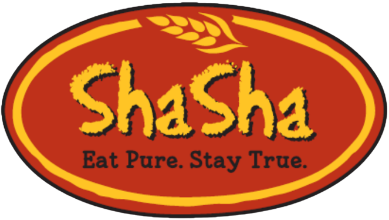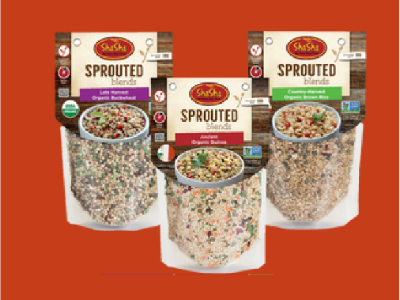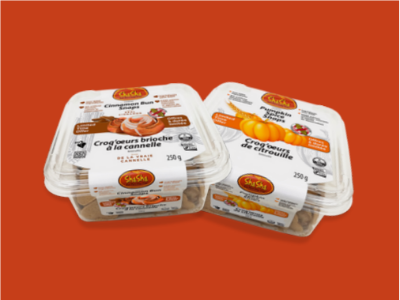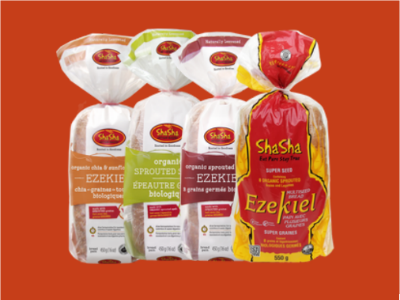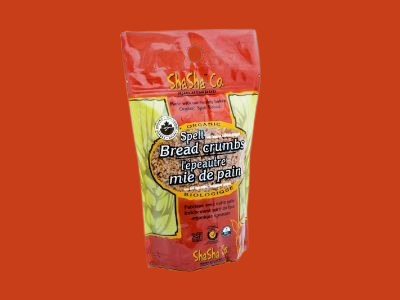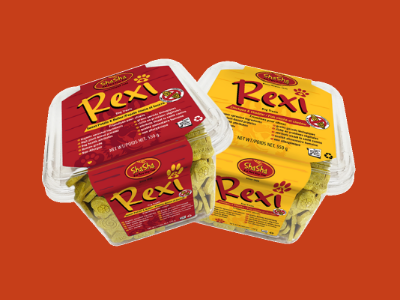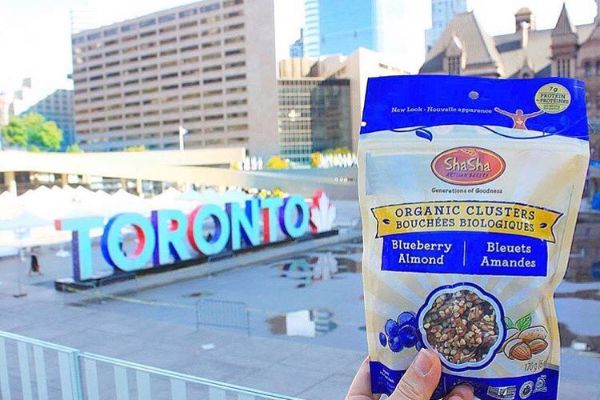In this section of our website,we hope to offer you a better understanding of how we at ShaSha Co. bake, process and contribute to health through our products.
Sprouting Bio-Bud
So what is sprouting, exactly?
Sprouting is the careful, time-consuming process of soaking, draining, and rinsing seeds until they germinate. ShaSha Co. has been doing their own sprouting since 1999; their purpose-designed facility is equipped with a modern sprouting system in which temperature, humidity and timing are carefully controlled for the best nutritional profile. Brown rice, mung beans, green lentils and adzuki beans to name few are all sprouted in-house under optimum conditions for delicious, highly nutritious results.
Sprouted grains are rich Wholesome all natural source of food and they are more bio-available. This is due to the fact that during the first 5-10 days of growth, all plants are at their maximum nutrient density. This is due in part to the fact that sprouts are baby plants which have delicate cell walls that enable their nutrients to be released more efficiently, thus making them great food At ShaSha Co. we sprout our own organic grains and seeds. The sprouted grains are then immediately mashed, mixed into the bread dough and baked in small batches. Sprouts are pesticide-free, locally grown, and available year round. In fact, tasty germinated grains cereals will play a significant role in the development of functional foods for the next century. We at Shasha Co. have been sprouting our own grains since 1999. We have developed a modern sprouting system, including well controlled time, temperature and humidity conditions for both during as well as post sprouting. Shasha Co. has invested, researched and developed the optimized sprouting condition to achieve the best nutrition profile through numerous experimental designs and nutritional analysis. We have then consistently used sprouted grains in our bakery products based on the specific and varied needs of individual grains and legumes.
Organic sprouted Adzuki Beans Bio-Bud™ products are made with sprouted grains, legumes and pods that are dehydrated at the peak of their enzyme levels and nutrient value, and packaged with no additives or preservatives. The sprouts are available on their own (use them in place of non-sprouted legumes and pods in your cooking) Cook in half the time.
The Adzuki bean, a humble little pink wonder bean from the far east. Sometimes called the weight loss bean. Commonly mispronounced, you will sometimes find them spelled azuki or aduki.
Health benefits:
- Low in calories and sodium
- High in magnesium, potassium, iron, zinc, copper, manganese, and b vitamins
- Contains protease inhibitors, which discourage the growth of cancerous cells
- Rich in soluble fiber, which binds to toxins and cholesterol to eliminate them from the body
- In Japan, adzuki beans are used to support kidney and bladder function
SPROUTED GRAINS By Daniel J. Crisafi, ND, MH, Ph.D.
Sprouts , their Health Benefits and Chemoprotective Properties.
Sprouts have many valuable attributes in relation to human health. Back in the 1920’s, an American Professor named Edmond Szekely put forward the concept and way of life of Bio-Buds Nutrition
He classified sprouted seeds and baby greens as the most beneficial foods and recommended that they make up 25% of our daily food intake, calling them life-generating Bio-genic foods which he claimed offer the strongest support for cell regeneration.
In our daily life, various factors transpire to create free radicals within our bodies.
Free radicals are highly unstable oxygen molecules needing an electron to stabilise their entropy (chaotic state).
By stealing electrons from healthy cells the causal effects of this are the breakdown of vital biological structures and the alteration of DNA and RNA (a process called per oxidation).
Once this has occurred, the affected cell will only reproduce the altered version.These superfoods are a powerful source of antioxidants (minerals, vitamins and enzymes) which assist in protecting against this damage.
A healthy body is alkaline (i.e not acidic). Bio-genic foods have an alkalising effect on the body.
Raw foods contain oxygen and regular consumption of raw bio-genic foods with their abundant oxygen is valuable to health. Double Nobel Prize winner Dr Otto Warburg found growth of cancer cells were initiated by a lack of oxygen and these cells, along with viruses and bacteria, could not live in an alkaline and oxygen rich environment.
Bio-Buds foods are a good source of essential fatty acids (the average western diet is generally deficient in these) which play a major role in the immune system defences and are one of the highest food sources of fibre.
When these superfoods are grown to the chlorophyll rich two leaf stage, it has been shown they have been effective in overcoming protein-deficiency anaemia. Some women have found that daily consumption of these superfoods has given relief from hot flushes and supported hormonal function.
The supply of vitamins (B complex and C) existing in seeds can be increased by the sprouting biochemistry over several days by 100% to 2000%. This biochemistry modifies the array of minerals in sprouts so that they are in a chelated form which is more easily assimilated in the body. It also denatures protein into the amino acid building blocks so that we can digest them in half the time of cooked foods.
Alive Magazine, August 1995
We all know that due to the presence of phytates, a certain amount of minerals present in whole grains are not absorbed. One of the most effective ways of “releasing” these minerals is by sprouting, or “malting” the grains. Malting also causes a beneficial modification of various nutritional elements.
According to research undertaken at the University of Minnesota, sprouting also increases the total nutrient density. Here is an example of malted wheat versus non-malted whole wheat:
- Vitamin B1 (thiamin) increase of 28%
- Vitamin B2 (riboflavin) increase of 315%
- Vitamin B3 (niacin) increase of 66%
- Vitamin B5 (pantathenic) increase of 65%
- Biotin increase of 111%
- Folic acid increase of 278%
- Vitamin C increase of 300%
Furthermore, these studies have also demonstrated a significant increase in various enzymes, including amylase, protease and lipase. This phenomenon is not restricted to wheat. All grains undergo this type of quantitative and qualitative transformation.

Civilization has flourished because of abundant supplies of nutritious grain. Bread has played a major role in our lives since its discovery ten thousand years ago in Asia Minor. The alchemy of sourdough bread making has been with us since 2600 BC. The Egyptians were making bread by methods similar in principle to the sourdough baking of today. Brewing and baking were closely connected in early civilizations. Man first discovered that soaking grain had nutritional and stimulating effects (beer) before discovering sourdough or the fermentation technique for baking. For all but a fraction of this time, bread was leavened naturally with airborne spores of sourdough culture. With what seemed a divine and invisible hand the sourdough culture miraculously created digestible bread.
At ShaSha Co. we have worked to recreate the ancient techniques of traditional sourdough baking – that is baking without commercial yeast using a natural sourdough culture – the unique combination of bacteria and fungus ShaSha’s Sourdough techniques have existed thousands of years and nowadays attracts more attention from our consumers than ever before because its wholesome process, with clean raw materials, great nutritonal profile, and a unique aroma and texture. We at ShaSha Co. have a strong in – house research and development facility with external academic support.
ShaSha Co. is the only bakery in Canada that has received the National Council of Canada IRAP, 1999 (Industrial Research Assistance Program) grant to research bacterial clutter for sourdough baking.
The word ‘Sourdough’ is a misnomer since ‘sour’ refers to the ‘mother’ or starter used to ferment the dough, not meant necessarily imply a sharp or vinegary taste. These is a symbiotic relationship between cultures of bacteria (lactobacilli) and airborne fungi (wild yeast); simply put, one element in the relationship provides something that the other element needs. Sourdough starter is basically made from water and grain flour, which create the environment and necessary food for these micro organisms to perform their magic.
The longer fermentation time of sourdough baking breaks the protein down into amino acids, However, Baker’s yeast stimulates the leavening process artificially and does not allow the time it takes for the bacteria and natural yeast interaction that are beneficial to occur. Thus the sufficient valuable lactic acid and acetic acid are missing from the final bread product.
The sourdough method with natural bacteria can activity boost lactic levels, greatly contributing to nutrition profile, moisture and flavour. Since the sourdough method acts as a natural preservative, chemicals such as calcium phosphate and others are not used. Our natural bacterial cultures originating from the Nile River and some from Ontario provide the
“mother” for our commercial yeast-free breads.
Canada is a young country, founded as a federation of provinces in 1867. Flour mills were operating in Canada more than 100 years earlier. The grandfather of all Canadian milling wheat was introduced to Canada in 1851.

We at ShaSha Co. mill our flour in Ontario without any additives or preservatives, it is the crafted old fashioned way of milling that minimizes the loss of nutrients.
Shasha Co. mills its flour at K2 Milling. K2 Milling began many years ago in the fields of reflection. I believed that the world was changing and people were losing touch with their food. I believed that kapital was finite and it had to be backed by real assets and used with acute kare. I wished for a simpler time when food was produced where you lived, by people you knew. I grew up in a family of millers. I worked at the family wheat flour mill for over sixteen years.
However, I longed for the days gone by when my father and grandfather knew all the farmers who delivered grain to the mill and the bakers, who baked with our flour. Certificates were not needed for verification, only a handshake and a look into each others eyes.
Once upon a time every town had their own mill. This is what inspires K2 Milling today. A return to brilliant simplicity.
Lokal grain, lokal mill. We are grinding; against the grain.
Mark Hayhoe
Kaptain K2 Milling Ltd.
